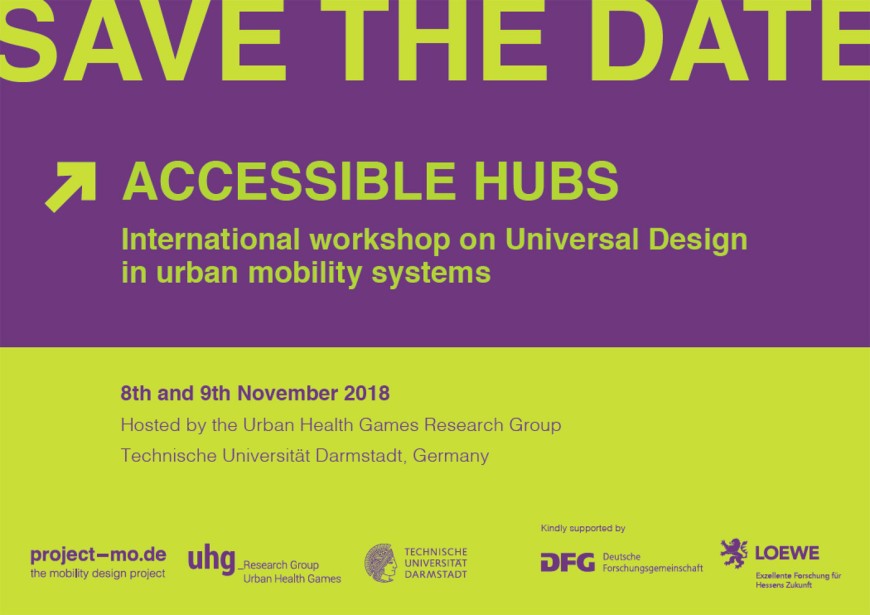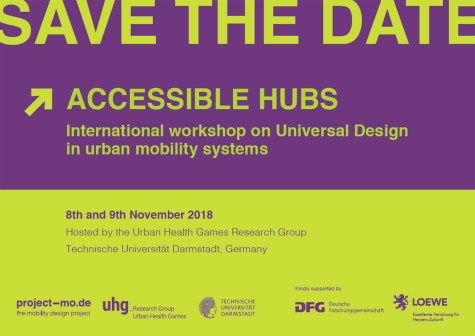Accessible Hubs
International workshop on Universal Design in urban mobility systems, 8th and 9th November 2018
14.08.2018

Research on sustainable urban mobility systems – giving priority to walking, cycling, public transport and sharing services – is driven by multiple societal factors, including the goals set out in the Paris climate treaty, equal access to affordable mobility, improve health and increase quality of life by “people-centred urban design”. To provide access to safe, affordable, accessible and sustainable mobility is key to UN Habitat III and its Sustainable Development Goals (SDGs) for cities. The specific needs of persons with disabilities should be considered at the starting point and central component rather than afterthoughts in implementing SDGs. Global NGOs recommend to address topics as multimodal travel chains, compact and mixed used urban planning, as well multifunctional and “complete” streets and public spaces. In Germany, existing policies have been extended recently, with the goal that all public transport will have to be “fully barrier free” by 2022. This leaves stakeholders world wide with open questions as to what constitutes barriers in public space, how can accessibility be implemented and how can it be connected to other SDGs. It is important to note that accessibility issues are multifaceted. For example, the perception of urban design factors such as building density, street network, shape and typology of open spaces is closely related to individual disposition and travel behaviours. More interdisciplinary research is needed to identify physical and mental barriers, to better understand accessibility and to develop more integrated urban design solutions.
Mobility hubs can play a pivotal role in providing equal access for people with specific mobility needs. They are evolving to address current societal changes in trade, digitalization and sharing economies. The term Accessible Hubs highlights that accessibility should be in the centre of this development. The scientific objectives of this international workshop are:
- To identify urban design factors hindering further implementation of accessibility in mobility systems.
- To gain a better understanding of guiding principles suitable to co create, implement and assess accessibility in urban mobility hubs.
- To identify new alliances that will research and implement new concepts of accessibility in urban mobility systems with regards to changing physical, social and digital affordances.
A specific focus is given to Universal Design as “a way of designing a building or facility, at little or no extra cost, so that it is both attractive and functional for all people, disabled or not’’ (Mace, 1985). In other words, specific accessibility needs of people with motoric or cognitive impairments, young children, families with infants, the elderly, etc) are the starting point to develop solutions that are easier to use or to access for all. The workshop will focus on medium-sized to regional mobility hubs in urban agglomerations in Europe addressing the following research questions:
- What are new alliances of stakeholders to implement Universal Design / Access for All principles in urban mobility hubs?
- What are specific urban design visions of Accessible Hubs in line with SDGs?
- What are factors that hinder implementation of Access for All in urban mobility systems?
- What are guiding principles to assess and implement Access for All in urban mobility design?
- What are new insights on the shape and structure of barriers that can be gained from selected interdisciplinary collaborations (i.e. environmental psychology, neuro urbanism)?
- How can relevant stakeholders be enabled to co design Accessible Hubs?
- What are new challenges and opportunities for “accessible hubs” arising from digitalization?
The program will include paper and poster presentations, panel discussions and good practices presentations.
Keynote Speakers
- Hansel Bauman
DeafSpace Institute, Gaulladet University, Washington DC - Gaurav Raheja
Centre for Excellence in TransportationSystems, Indian Institute of Technology (IIT), Roorkee, India - Jennifer J. Roe
Centre for Design and Health, School of Architecture, University of Virginia, VA
The organising team
Martin Knöll / Marianne Halblaub Miranda / Gladys Vasquez Fauggier / Sabine Hopp / Urban Health Games research group /Technische Universität Darmstadt
Registration
Participation is free of charge. Please register until october 15th via e-mail to hubs@stadt.tu-….
Further information
Please download the flyer (below) or visit www.stadtspiele.tu-darmstadt.de/hubs


